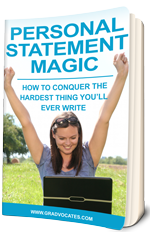How to Write a Great Personal Statement: Part One

Make a Good First Impression by Hooking the Reader’s Attention
You never get a second chance to make a first impression.
—Source Unknown
Members of admission committees are charged with the responsibility of reading thousands of personal statements. This is both a daunting and boring task. You can, however, use this to your advantage by hooking the reader’s attention with an extremely interesting and well-written introduction. After reading dozens of mediocre personal statements, your exciting introduction will be a refreshing treat and will induce the reader to read the rest of your personal statement with enthusiasm.
Do Not Start or End with a Quote or Cliché
Always be a first-rate version of yourself, instead of a second-rate version of somebody else.
—Judy Garland
We are aware that we started this section with a quote; however, we are not writing a personal statement. Admission committee members do not want to hear wise words of wisdom from some author, politician, or celebrity, and using such a quote does nothing to tell the reader about you. This is a personal statement; as such, it is critical that you write your own story in your own words. Furthermore, many schools impose word limits of 500 words or two pages. Do not waste valuable words with a quote that says nothing about you and that will only make the reader roll their eyes.
Be as Interesting and Unique as Possible
It’s pretty damn hard to bring your uniqueness into actual being if you’re always doing the same things as a lot of other people.
—Brendan Francis
This point is best demonstrated by two examples:
A friend asked us to read her personal statement, which was about how a role model inspired her to attend graduate school to pursue international relations. After reading her personal statement, we were perplexed at her topic choice. We asked her why she would write such a dull essay, which wasn’t even really about her, when she has spent much of her life living abroad in Europe and South America. She rewrote her essay, detailing her exciting experiences abroad and integrated them with her desire to study international relations.
Another example involves a client of ours when we were still operating under SimuGator Editing. She wrote a law school personal statement that rehashed her resume and only briefly mentioned that she had worked as a secretary at a law firm. Upon further inquiry, it turned out that she had worked at the law firm for two years where she gained invaluable experience in communicating with clients, handling discovery issues, and researching case law for motions. After advising her that she should write her personal statement about her job at the law firm, the experience that she gained, and why it compelled her to attend law school, our client took our advice and ended up with an impressive personal statement.
Don’t Ignore Word Limits or Write Too Much
The most valuable of all talents is that of never using two words when one will do.
—Thomas Jefferson
At most schools, word limits are not a suggestion. In addition to showing that you can follow basic rules, obeying the word limit will show that you can write succinctly and effectively. Ignoring word limits needlessly puts your application at risk.
Along the same lines, if your essay’s limit is two pages, then you should not change font size, spacing, or margins to bring your essay into compliance. Such manipulations are incredibly obvious and should be avoided.
Essays can be edited down to comply with the word requirement. It just takes a little creativity and an acceptance that every word you write is not golden.
Don’t Write Your Autobiography; Do Summarize Its Most Interesting Chapter
An autobiography is a book a person writes about his own life, and it is usually full of all sorts of boring details.
—Roald Dahl
One of the top personal statement problems occurs when applicants rewrite their resumes or try to summarize every one of their life experiences. Doing this is like trying to squeeze your entire autobiography into a short essay. We are sure that admission committee members would love to read your autobiography after you graduate from their school and become highly successful; however, now is not the time for that.
Trying to account for every life experience in a temporal manner is highly ineffective. Admission committee members already have your resume and transcript, which they have most likely looked at before turning to your personal statement. Instead of summarizing what they already know, take the opportunity to impress them with a story that is interesting and exciting to read, and then relate it back to why you would be a great student or good fit for the school that you are applying to.
Get a Professional Opinion
Hire people who are better than you are, then leave them to get on with it. Look for people who will aim for the remarkable, who will not settle for the routine.
—David Ogilvy
Your personal statement is one of the most difficult and important pieces of writing you will ever produce. It needs to be absolutely perfect. If you are unsure of whether it is, in fact, perfect, then you need to get a professional opinion as to its content, grammar, and writing style. Because family and friends are too willing to please, their advice will only take you so far.
If you want your personal statement to be perfect, then let us help by purchasing our law school personal statement editing package. We guarantee that we will not stop until your personal statement is truly remarkable.


